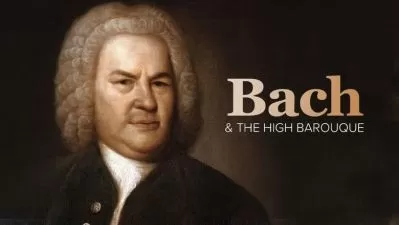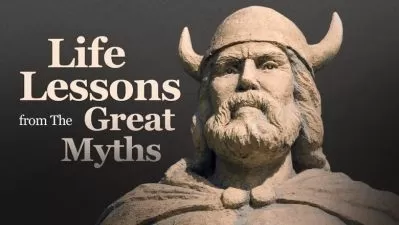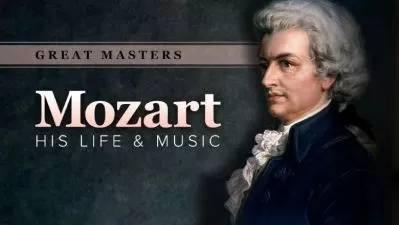Great Masters: Beethoven-His Life and Music
Robert Greenberg
6:04:47
Description
Ludwig van Beethoven was one of the most prolific and inspiring forces in the history of music. With his brilliant compositions and his unique approach to the piano, he changed the face of western concert music forever. After Beethoven nothing could ever be the same again.
This course by Professor Robert Greenberg is a biographical and musical study of Beethoven . It puts the great musician's life in a social, political, and cultural context.
First and foremost, it is a biographical study, and includes excerpts from more than a dozen of Beethoven's works.You will learn about Beethoven's:
- Dysfunctional family life and relationships with his mother, father, paternal grandfather, and brothers
- Musical training, especially his unique approach to the piano
- Appearance and attitude
- Celebrity in music- and piano-crazed Vienna
- Compositional successes including symphonies, piano sonatas, and string quartets, among many others
- Hearing loss and the crisis of 1802
- Delusions and his relationship with his nephew Karl.
You learn about the core features of some of his greatest music, but without the detailed, technical analyses in the courses The Symphonies of Beethoven, or in the Concert Masterworks series, wherein Professor Greenberg discusses Beethoven's Emperor Concerto and Violin Concerto.
Reinventing Musical Expression in the Western World
Beethoven's appearance was somewhat off-putting. He was short with a thick body and an unusually large head, covered with his famous wild hair. Heinrich Friedrich Ludwig Rellstab, a journalist, music critic, and contemporary of Beethoven's, described his hair as "Not frizzy, not straight, but a mixture of everything."
Beethoven was physically clumsy; he was liable to knock over or break anything he touched. He could not keep time when dancing and had problems cutting and shaping the quill pens he needed for writing.
Beethoven exhibited a pathological hatred for authority, a persecution complex, and delusional behaviors. With his deafness, these problems forced him to look inward and reinvent himself. In doing so, he reinvented the nature of musical expression in the Western world.
An Artist of Musical Transformations
Beethoven experienced "rebirth" as an artist three times over the course of his life.
Intense Composition
He was born December 17, 1770, into a dysfunctional family with an abusive and alcoholic father and a depressed mother. His musical talent was recognized early, but his father attempted to beat him into becoming a child prodigy to rival Mozart. It was a futile attempt; there could only be one Mozart.
By 1785, the young Beethoven was the family breadwinner and, in 1787, the primary caregiver for his younger brothers. In 1789, he sought and was granted some relief from these responsibilities from local authorities and experienced his first musical rebirth.
It was for him a time of intense composition. He wrote five sets of piano variations, ballet music, concert arias, chamber works for piano and winds, and two cantatas for vocal soloists, chorus, and orchestra.
Pianist and Hero
When he moved to Vienna to study with Haydn in 1792, Beethoven "was living with a reputation as a virtuoso pianist in a city that was mad for pianists," says Professor Greenberg. "He outplayed virtually every other pianist in the city in competitions and became the darling of the Viennese aristocracy. During this same time, he took lessons with Haydn, although his dislike of authority figures made most music lessons a waste of time."
These early years in Vienna were also significant for his compositional career. From 1792–1803, he produced, among many other works, the Opus 1 Trios for Piano, Violin, and 'Cello; the Opus 18 string quartets; and the Symphony no. 1 in C Major.
Meanwhile, his popularity outside Vienna increased. In 1801, Beethoven's career and finances were flourishing, but he was in poor health. His hearing loss was becoming progressively worse, and he grew more and more depressed and anxious.
His emotional crisis reached a peak in 1802—but served as the creative catharsis that brought about a second musical rebirth a year later, in a self-sufficient and heroic guise, struggling against his fate.
He took as a model for this new self-image Napoleon Bonaparte, who at the time, represented a vision of individualism and empowerment.
Beethoven's music reflects this vision in its insistence on expressing the heights and depths of the artist's emotions. His Symphony no. 3 in E-flat Major, op. 55, for example, was revolutionary in its proportions and dramatic expressive content.
This first of the "Heroic Symphonies" changed the history of Western music.
During this compositional period from 1803–1812,Beethoven produced masterworks: the Fourth, Fifth, and Sixth Symphonies; the Violin Concerto; the Choral Fantasy; the Fourth and Fifth Piano Concerti; the five middle string quartets; the Mass in C Major; and the opera Fidelio.
But toward the end of this period, Beethoven experienced a short affair with the mysterious "Immortal Beloved," an episode that ultimately precipitated his fall into despair and public ridicule.
In his youth, Beethoven had been irrationally possessive and jealous of his brothers. So when his brother Carl died, Beethoven transferred these feelings to his nephew Karl and pursued four years of destructive litigation to gain guardianship of the boy.
"Modern" Works and the Ninth Symphony
In 1819, Beethoven used events, once again, as a catalyst for an artistic rebirth. In the last years of his life, he wrote many of his most profound, most "modern" works, including the six late string quartets, the Ninth Symphony, and the Missa Solemnis.
Beethoven's Symphony no. 9 became the single most influential piece of music composed in the 19th century. The work breaks with time-honored conventions and distinctions to give precedence to the expressive needs and desires of the artist.
During these years, Beethoven was consumed by his craft, but socially, he was still difficult with friends, family, and business associates.
An "Impossible" Composer
Beethoven died March 26, 1827. At the end of his life he had managed a reconciliation with his family and was given an affectionate tribute by the Viennese people.
When Gioacchino Rossini met Beethoven in 1822, he was stunned by the squalor of his apartment and the sadness of the artist himself. As Frances Toye tells the story, "Later, Rossini tried to do something for Beethoven, himself heading a subscription list. To no purpose, however. The answer [the Viennese gave] was always the same: Beethoven is impossible.'"
Works you'll hear in the lectures are excerpted from:
Symphony no. 7 in A Major, op. 92 (1812)Missa Solemnis in D Major, op. 123 (1823)
Symphony no. 8 in F Major, op. 93 (1812)
Wellington's Victory , op. 91 (1813)
Piano Sonata in B-flat Major, op. 106 (1818)
Piano Sonata in C Major, op. 53 (1804)
Symphony no. 3 in E-flat Major, op. 55 (1805)
String Quartet no. 7 in F Major, op. 59, no. 1 (1806)
String Quartet no. 9 in C Major, op. 59, no. 3 (1806)
Symphony no. 6 in F Major, op. 68 (1808)
Piano Concerto no. 4 in G Major, op. 58 (1806)
Symphony no. 5 in C Minor, op. 67 (1808)
Symphony no. 9 in D Minor, op. 125 (1824)
More details
User Reviews
Rating
Robert Greenberg
Instructor's CoursesDr. Robert Greenberg is Music Historian-in-Residence with San Francisco Performances. A graduate of Princeton University, Professor Greenberg holds a Ph.D. in Music Composition from the University of California, Berkeley. He has seen his compositions—which include more than 45 works for a wide variety of instrumental and vocal ensembles—performed all over the world, including New York, San Francisco, Chicago, Los Angeles, England, Ireland, Greece, Italy, and the Netherlands.
He has served on the faculties of the University of California, Berkeley; California State University, Hayward; and the San Francisco Conservatory of Music, and has lectured for some of the most prestigious musical and arts organizations in the United States, including the San Francisco Symphony, the Lincoln Center for the Performing Arts, the Van Cliburn Foundation, and the Chicago Symphony. For The Great Courses, he has recorded more than 500 lectures on a range of composers and classical music genres.
Professor Greenberg is a Steinway Artist. His many other honors include three Nicola de Lorenzo Composition Prizes and a Koussevitzky commission from the Library of Congress. He has been profiled in various major publications, including The Wall Street Journal; Inc. magazine; and the London Times.
You can find more music content from Robert Greenberg on Patreon: https://www.patreon.com/RobertGreenbergMusic.

The Great Courses
View courses The Great Courses- language english
- Training sessions 9
- duration 6:04:47
- Release Date 2023/05/09



























